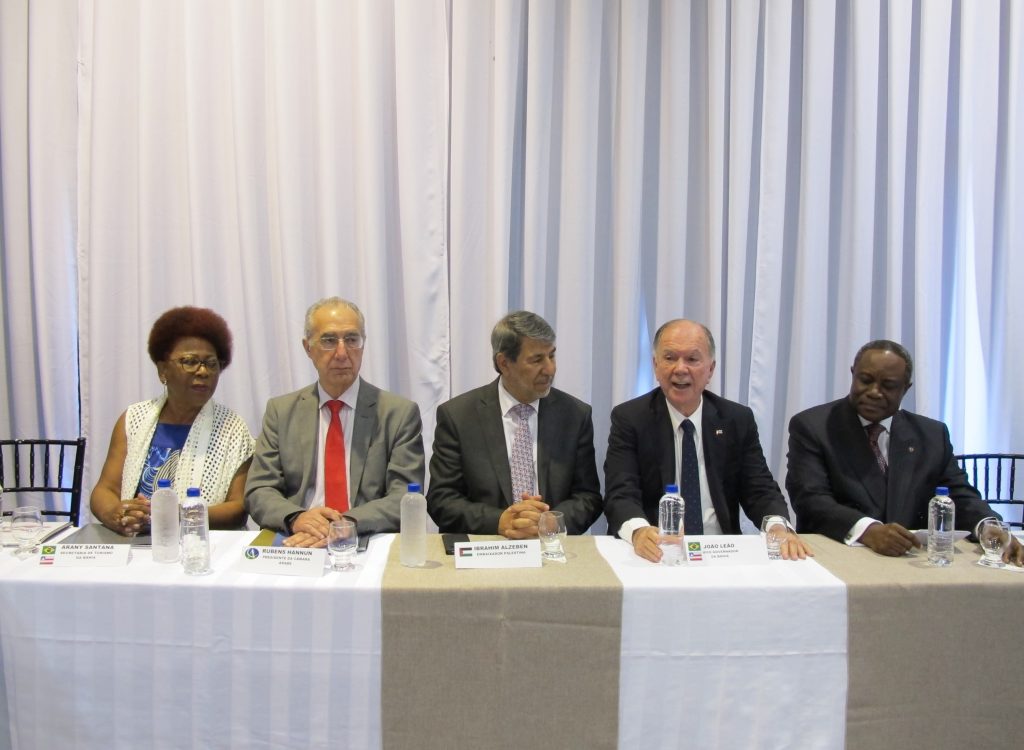Salvador – Arab and Africans ambassadors are on a joint mission to Bahia and they met, on Tuesday (19) afternoon, in Salvador, the state’s vice governor, João Leão (second, from right to left, in the picture above) and part of the state’s secretariat. The diplomats and officials from Bahia state government discussed the creation of a workgroup to explore business and cooperation opportunities between Bahia and the nations of the Middle East and Africa, based on a proposal made by the president of the Arab Brazilian Chamber of Commerce, Rubens Hannun, who attended the meeting.
“We are certain that a state that promotes happiness has many opportunities,” said Hannun, mentioning the slogan “Bahia, Terra da Felicidade” (Bahia, Land of Happiness) used by the state. “To put this into play (cooperation actions), I would like to suggest the creation of a workgroup between the Arab Chamber and Bahia,” he added.
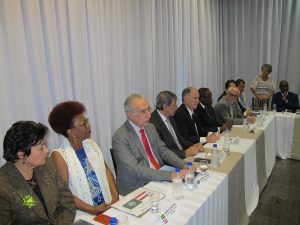
Hannun proposed for this group to work focusing on three points: the organization of a trade expo to promote in the state Arab and African products, tourist destinations and culture, in a place to be chosen by the state government; the organization of a mission from Bahia to the Arab world to promote the state’s products, innovations, culture and tourism; and to add Bahia in a research on the complementarities between Brazil and the Arab nations in the food security sector that is being conducted by the Arab Chamber.
“We can verify in this research, for instance, how to implement maritime connections to facilitate the logistics involving food transportation,” said Hannun. Brazil is a large food producer and Bahia has one of the highest productivity rates per hectare in the country, while most of the Arab world need to import food in large quantity.
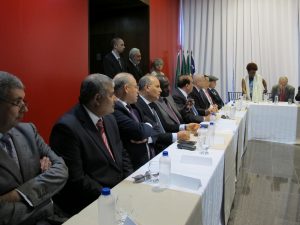
Hannun appointed the Market Intelligence director of the Arab Chamber, Tamer Mansour, to coordinate the creation of the workgroup on the organization side, and João Leão appointed the state Chief of Staff, Bruno Dauster, to do the same on the state government’s side. “Everything that you said interest us, we have a wide interest in economic development and international partnerships,” said the vice governor to Hannun.
As an example, Leão said that he recently went on a trip to China and India, where he signed protocols of intention with the governments and companies of these countries with the goal to promote investments in the state. “Bahia is full of opportunities,” he remarked.
Dauster, for his turn, highlighted some of the region’s main economic activities, such as the Camaçari Petrochemical Part, Latin America’s largest, the auto industry and agribusiness. To ANBA, he said that these three sector have a strong presence of foreign corporations, such as Basf and Dow in the chemical sector, Ford in the auto industry, and European corporation in the production of meat, milk, sugar and ethanol, and Chinese and Korean companies in the energy and telecommunications sectors.
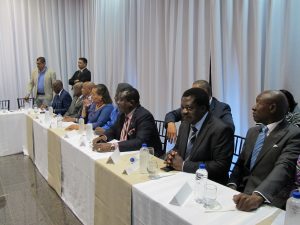
He said that there are projects that can be interesting to Arab investors, such as a fertilizer plant that Petrobras put on sale, a stake participation at Landulpho Alves Refinery (RLAM), the country’s second largest, also put on sale by the Brazilian state-owned oil company, and a possible participation in a shipyard in the state which has a Japanese equity participation.
In the tourism sector, José Alves, the state’s tourism secretary, said that one of his missions is to increase the number of flights to the state. He said that the airline from Cape Verde will begin to fly to Salvador this month and asked the ambassadors to help him begin negotiations with airlines from their countries.
Connections
The diplomats pointed out the deep connections between Bahia and the Arabs and Africans. “Our ancestors came and settled in this land, we feel like we are among family,” said the dean of the Council of Arab Ambassadors in Brazil, Ibrahim Alzeben, who’s Palestine’s ambassador in Brazil. “We are here not only in search of investments and business, but also in search of our Arab and African roots, founded over 500 years ago,” he added.
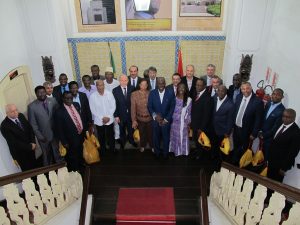
Salvador is considered to be the most African city in Brazil, since most of the population is of African descent. “We have a common history and culture,” said the dean of the Council of African Ambassadors, Martin Mbeng, who is Cameroon’s ambassador in Brazil. “We hope that this visit can strengthen these connections. We encourage people from Bahia to visit Africa and the Arab countries as tourists and to come see our investment opportunities,” he remarked.
To journalists, Alzeben added that, on Wednesday (20), there will be an event organized by the Federation of Industries of the State of Bahia (FIEB) in which the ambassadors will meet with local entrepreneurs and will be able to detail the possibilities to expand economic relations, “a golden opportunity.”
Also to journalists, Hannun mentioned the opportunities in the fruit, meats, petrochemical and renewable energies sectors. “We have to promote actions, so relations are sustainable,” he said.
House of Angola
Earlier, the diplomats visited the cultural center Casa de Angola (House of Angola), in Salvador’s historic downtown, at the invitation of Angola’s ambassador Nélson Cosme, who is part of the delegation. The center was founded 20 years ago, and its headquarters is a two-store house built in the first half of the 18th century.
The ambassadors took a tour guided by the Casa de Angola’s director, Benjamim Alexandre Sabby. The center has a library with books on Angola and Africa in general, a museum with religious artifacts, folk art works and objects of daily and ceremonial use in the country’s villages, plus an exhibit of paintings by Angolan visual artist Arlete Marques.
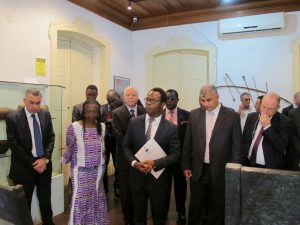
“The Casa of Angola is in the tourism guide of Bahia and Salvador. In addition to tourists, we also welcome schools and academics that are researching Africa’s history and literature,” said Nélson Cosme. “This place represents all of us,” said Alzeben.
In the meeting with the vice governor, Alzeben recalled that, in a previous visit made by Arab diplomats to the state, in 2013, they discussed the creation of a Arab House in Salvador, but that the project was not implemented. João Leão asked the state’s Culture secretary, Arany Santana, to check if there’s any real estate available in the city’s historic downtown so it can be used for this purpose. “Let’s speed up this process,” he said.
As part of the delegation are diplomats from Jordan, Libya, Algeria, Egypt, Iraq, Mauritania, Morocco, Tunisia, Oman, Sudan, Arab League, Ivory Coast, Cape Verde, Botswana, Mali, Namibia, Malawi, Ghana, Togo, Tanzania, Benin, Democratic Republic of the Congo and Mozambique, plus the CEO of the Arab Chamber, Michel Alaby.
Translated by Sérgio Kakitani



